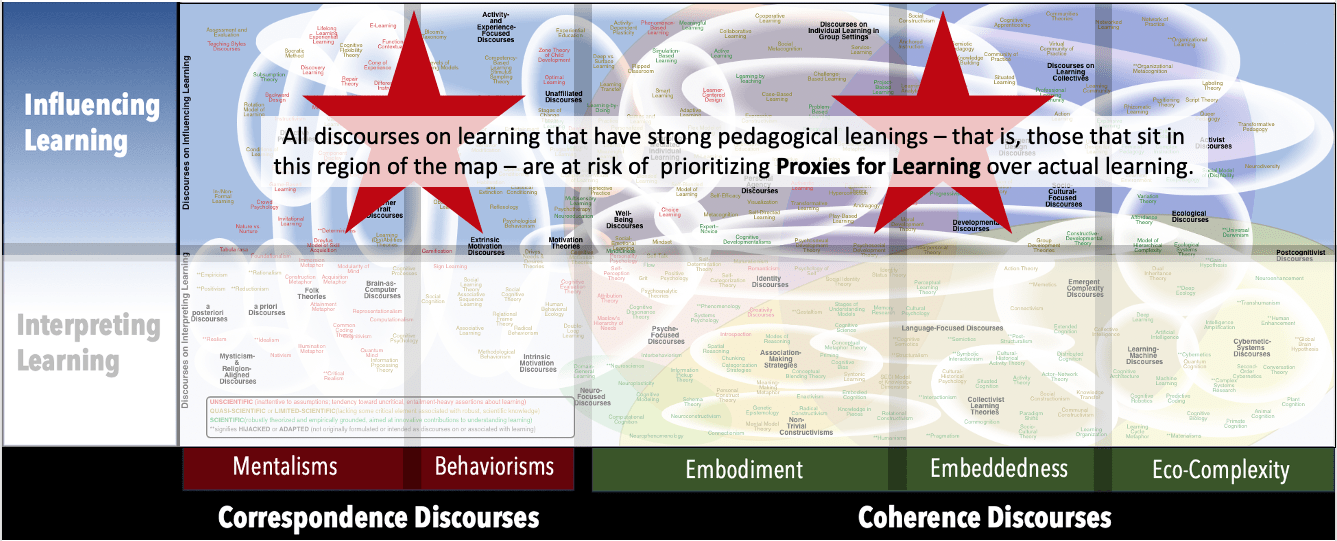Focus
Easy-to-see substitutes for actual learningPrincipal Metaphors
- Knowledge is … objects or goals (specified content)
- Knowing is … (invisible) competence
- Learner is … a school attendee
- Learning is … complying
- Teaching is … managing school attendees
Originated
Proxies for Learning have likely been around for as long as efforts at formal instruction. The concept itself, however, was proposed in the 2000s.Synopsis
Prompted by the fact that actual learning can be subtle and very difficult to notice and interpret, Proxies for Learning are readily implemented and easy-to-observe substitutes for that learning. They include:- Students are kept busy (e.g., attending to explanations, taking notes, doing seatwork, getting hands-on experience)
- Students are engaged collaboratively in small- or large-group discussions.
- Students are getting feedback and attention.
- Students have input into the topics and structures of lessons.
- The classroom is under control.
- The lesson is orderly.
- The curriculum is covered.
- Some students can provide correct answers to curriculum-based questions.
- Students have personalized learning plans.
- Academic Journaling – the widespread practice of requiring students to record impressions, reflections, insights, and other thoughts at the end of a class session. Proponents typically assert with confidence that the activity supports learning, but the evidence falls far short of the claims. (Lesson-ending writing activities that are specifically addressed to and routinely reviewed by teachers seem to be somewhat effective – but such activity is clearly more about influencing teaching than consolidating learning.)
- Homework – practice outside of a formal learning setting (Homework is a highly contested topic, owing in large part to uncritical or shallow understandings of Practice, some sorts of which are highly effective. Unfortunately, it is difficult to ensure that homework, which is typically unsupervised, will afford such practice – thus potentially creating situations in which homework amplifies difference by providing the “already-competent” with practice appropriate to them and the “emerging-competent” with the sort of practice that enables neither deeper insight nor greater skill. A vicious circle can be set up as educators who benefitted from homework that was well-fitted to their competencies are compelled to make decisions on homework for others who are in very different circumstances.)
- Law of Triviality (C. Northcote Parkinson, 1950s) – the assertion that people tend to pay disproportionate amounts of attention to inconsequential matters. Stated in terms of formal education, enthusiasm for an innovation tends to be inversely proportional to the proven significance of that innovation for learning.
Commentary
Proxies for Learning are tied to the assumption that learning occurs invisibly inside the head – that is, to an orienting and defining assumption of most Correspondence Discourses on learning. Arguably, in fact, the ubiquity of Proxies for Learning in modern classrooms may be residue of having yielded to the working principle of Behaviorisms that learning cannot be seen – that is, effectively, the conviction that everything educators do are Proxies for Learning. That said, EVERY discourse in the upper region of the map (“Influencing Learning”) is susceptible to substituting and/or mistaking Proxies for Learning for actual learning – which, in fact, is one of the original motivations for this website. An orienting principle in this project has been that the discourses on learning that dominate education are too often more focused on the actions of teaching (i.e., “Influencing Learning,” the top region of the map) than the dynamics of learning (i.e.., “Interpreting Learning,” the lower region of the map).Authors and/or Prominent Influences
Robert CoeStatus as a Theory of Learning
The notion of Proxies for Learning is precisely (and deliberately) the opposite of a theory of learning. That is, Proxies for Learning are, in effect, strategies for ignoring learning.Status as a Theory of Teaching
While not theories of teaching, per se, Proxies for Learning are strategies and practices used by teachers.Status as a Scientific Theory
Proxies for Learning are not scientific theories. They aren't intended to be. The concept operates as a focused criticism of formal education’s frequent failure to attend to the subtleties and complexities of the phenomenon of learning – that is, it is a commentary on the unscientific nature of many defining aspects of modern schooling.Subdiscourses:
- Academic Journaling
- Homework
- Law of Triviality
Map Location

Please cite this article as:
Davis, B., & Francis, K. (2023). “Proxies for Learning” in Discourses on Learning in Education. https://learningdiscourses.com.
⇦ Back to Map
⇦ Back to List
